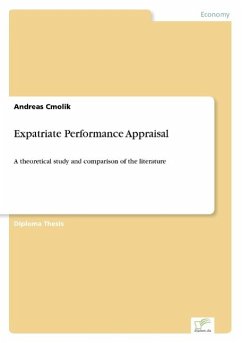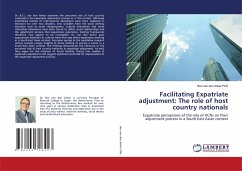
In Search of the Best Suited Expatriate
An Empirical Study on the Applicability of Literature
Versandkostenfrei!
Versandfertig in 1-2 Wochen
58,00 €
inkl. MwSt.

PAYBACK Punkte
0 °P sammeln!
Doctoral Thesis / Dissertation from the year 2001 in the subject Business economics - Business Management, Corporate Governance, University of Linz (Sozial- und Wirtschaftswissenschaften), language: English, abstract: Inhaltsangabe:Abstract:Much has been written on expatriation so far but literature is mainly US based. An exhaustive critical literature review serves to discover underresearched areas, to look for aspects from other disciplines that could be enriching, and to identify areas where empirical data are missing or weak.In order to test the applicability of articles on expatriation to...
Doctoral Thesis / Dissertation from the year 2001 in the subject Business economics - Business Management, Corporate Governance, University of Linz (Sozial- und Wirtschaftswissenschaften), language: English, abstract: Inhaltsangabe:Abstract:
Much has been written on expatriation so far but literature is mainly US based. An exhaustive critical literature review serves to discover underresearched areas, to look for aspects from other disciplines that could be enriching, and to identify areas where empirical data are missing or weak.
In order to test the applicability of articles on expatriation to different contexts, an empirical study on expatriation in Austria is conducted. Information on the Austrian background, where data on expatriation simply do not exist, are gained through explorative interviews with personnel managers of Austrian companies and with former expatriates.
Based on those, and on the findings from literature, hypotheses are created, which are tested with the help of a large questionnaire study among expatriates from Austrian and foreign controlled companies located in Austria.
Although considered as essential for a successful completion of the foreign assignment in theory, some fields are only rarely found in practice (e.g. predeparture training, support for family). Others, on contrast, are seldom mentioned in the literature but of high practical relevance (e.g. goal setting, psychological level, distinction between different types of expatriates according to different transfer aims or different host countries). In most of the cases, the applicability of studies is limited. Certain factors have to be adapted according to different contexts.
Inhaltsverzeichnis:Table of Contents:
I.INTRODUCTION8
1.Descriptive Outline of the Phenomenon8
2.Austria s Role in International Business10
a.Austrian Economy10
b.Expatriation in Austria13
3.Research Objectives14
4.Structure14
II.THE EXPATRIATE EXPERIENCE -LITERATURE SURVEY16
1.International Human Resource Management16
a.Staffing Approaches16
b.Locals or Expatriates?18
2.Reasons for Expatriation19
a.Companies Reasons for Expatriation19
b.Employees Motivations to Accept or Refuse a Foreign Assignment22
3.The Expatriation Process23
a.Selection23
b.Preparation50
c.Training53
d.Living and Working Abroad58
e.Reentry Phase68
4.Gender Differences in Expatriation & The Female Expatriate73
a.Characteristics of Male and Female Expatriates74
b.Reasons for the Scarcity of Women in International Management74
c.The Foreign Assignment78
III.METHODOLOGY81
1.Interviews81
a.Qualitative Methods81
b.Data Collection and Analysis84
c.Interviews with Personnel Managers84
d.Interviews with Former Expatriates86
2.Questionnaire87
a.Data Collection and Analysis87
b.Statistical Techniques89
3.Limitations of the Study92
a.Generalization92
b.Limitations92
c.Reliability95
d.Validity95
IV.OUTCOMES96
1.Summary of the Interviews96
a.Interviews with personnel managers96
b.Interviews with former expatriates97
2.Results of the Questionnaire Study97
a.Sample(s)97
b.Test of Hypotheses101
3.Gender Differences131
V.SUMMARY AND IMPLICATIONS142
1.Summary of the Most Important Findings142
a.Literature142
b.Empirical Study144
2.Implications145
a.Implications to Theory Recommendations for Further Research145
b.Implications for Practice147
3.Conclusion149
REFERENCES150
APPENDIX160
Much has been written on expatriation so far but literature is mainly US based. An exhaustive critical literature review serves to discover underresearched areas, to look for aspects from other disciplines that could be enriching, and to identify areas where empirical data are missing or weak.
In order to test the applicability of articles on expatriation to different contexts, an empirical study on expatriation in Austria is conducted. Information on the Austrian background, where data on expatriation simply do not exist, are gained through explorative interviews with personnel managers of Austrian companies and with former expatriates.
Based on those, and on the findings from literature, hypotheses are created, which are tested with the help of a large questionnaire study among expatriates from Austrian and foreign controlled companies located in Austria.
Although considered as essential for a successful completion of the foreign assignment in theory, some fields are only rarely found in practice (e.g. predeparture training, support for family). Others, on contrast, are seldom mentioned in the literature but of high practical relevance (e.g. goal setting, psychological level, distinction between different types of expatriates according to different transfer aims or different host countries). In most of the cases, the applicability of studies is limited. Certain factors have to be adapted according to different contexts.
Inhaltsverzeichnis:Table of Contents:
I.INTRODUCTION8
1.Descriptive Outline of the Phenomenon8
2.Austria s Role in International Business10
a.Austrian Economy10
b.Expatriation in Austria13
3.Research Objectives14
4.Structure14
II.THE EXPATRIATE EXPERIENCE -LITERATURE SURVEY16
1.International Human Resource Management16
a.Staffing Approaches16
b.Locals or Expatriates?18
2.Reasons for Expatriation19
a.Companies Reasons for Expatriation19
b.Employees Motivations to Accept or Refuse a Foreign Assignment22
3.The Expatriation Process23
a.Selection23
b.Preparation50
c.Training53
d.Living and Working Abroad58
e.Reentry Phase68
4.Gender Differences in Expatriation & The Female Expatriate73
a.Characteristics of Male and Female Expatriates74
b.Reasons for the Scarcity of Women in International Management74
c.The Foreign Assignment78
III.METHODOLOGY81
1.Interviews81
a.Qualitative Methods81
b.Data Collection and Analysis84
c.Interviews with Personnel Managers84
d.Interviews with Former Expatriates86
2.Questionnaire87
a.Data Collection and Analysis87
b.Statistical Techniques89
3.Limitations of the Study92
a.Generalization92
b.Limitations92
c.Reliability95
d.Validity95
IV.OUTCOMES96
1.Summary of the Interviews96
a.Interviews with personnel managers96
b.Interviews with former expatriates97
2.Results of the Questionnaire Study97
a.Sample(s)97
b.Test of Hypotheses101
3.Gender Differences131
V.SUMMARY AND IMPLICATIONS142
1.Summary of the Most Important Findings142
a.Literature142
b.Empirical Study144
2.Implications145
a.Implications to Theory Recommendations for Further Research145
b.Implications for Practice147
3.Conclusion149
REFERENCES150
APPENDIX160














